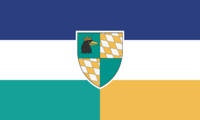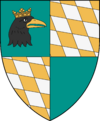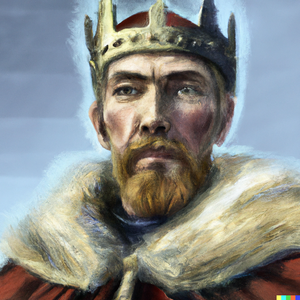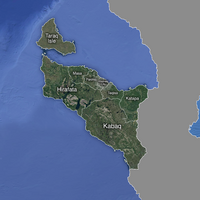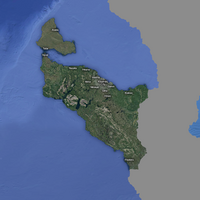Kisanaq: Difference between revisions
No edit summary |
No edit summary |
||
| Line 99: | Line 99: | ||
The current serving head of state is Emperor Ataraq II. Ki Maqi, the eldest son of Adila IV. Ki Maqi, the former Naquese Emperor, and Kata VII. Ka Lakaraq, the Princess of Giha. In 2020, Ataraq's net worth was estimated around US$4 billion. | The current serving head of state is Emperor Ataraq II. Ki Maqi, the eldest son of Adila IV. Ki Maqi, the former Naquese Emperor, and Kata VII. Ka Lakaraq, the Princess of Giha. In 2020, Ataraq's net worth was estimated around US$4 billion. | ||
===Federal subdivisions === | ===Federal subdivisions === | ||
[[File:Regions of Kisanaq.png|200px|left|Regions of the Naquese Crown State]] | |||
Kisanaq is divided into 8 regions, with the capital of Kisanaq City acting as its own region. | Kisanaq is divided into 8 regions, with the capital of Kisanaq City acting as its own region. | ||
| Line 164: | Line 165: | ||
}} | }} | ||
[[File:Cities of Kisanaq.png| | [[File:Cities of Kisanaq.png|200px|left|Largest Cities of the Naquese Crown State on a map]] | ||
Revision as of 14:54, 1 January 2023
This article is incomplete because it is pending further input from participants, or it is a work-in-progress by one author. Please comment on this article's talk page to share your input, comments and questions. Note: To contribute to this article, you may need to seek help from the author(s) of this page. |
The Naquese Crown State Kisanaqa Tanala Hata (Naquese) | |
|---|---|
Motto: God, Nation, Emperor | |
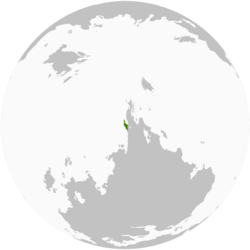 Location of Kisanaq | |
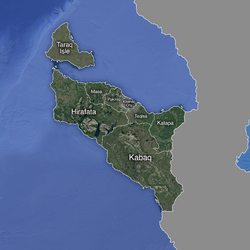 Satellite map of Kisanaq | |
| Capital | Kisanaq City |
| Official languages | Kisanaq |
| Religion | Misakate |
| Demonym(s) | Kisanaq (noun) Kisanaq (adjective) |
| Government | Unitary parliamentary constitutional monarchy |
• Emperor | Ataraq Ki Maqi |
• Prime Minister | Adila Ki Faran |
| Population | |
• Estimate | 8,678,833 |
| GDP (nominal) | estimate |
• Total | |
• Per capita | |
| HDI | 0.978 very high |
| Currency | Kisanaq Anatak (KIA) |
| Driving side | right |
| Calling code | +101 |
Kisanaq, officially the Naquese Crown State, is a country in northern Athenia, occupying the small Kisanaq Peninsula and the nearby Taraq Isle. Kisanaq is a constitutional monarchy and a developed country with an advanced high income market economy. Its capital and largest city, the Kisanaq City, serves as a financial centre of north Athenia and hosts the headquarters of many multinational corporations.
As a constitutional monarchy, Kisanaq is ruled by a hereditary monarch who holds ceremonial powers. The country's government is led by a prime minister and a parliament, which is elected by the people. Kisanaq has a strong tradition of democracy and rule of law, and the country is known for its commitment to human rights and civil liberties.
In addition to its strong market economy, Kisanaq is also known for its advanced technological infrastructure. The country has a highly developed telecommunications network, and is a leader in the development of new technologies such as artificial intelligence and renewable energy. The government of Kisanaq has also made significant investments in research and development, which has helped the country to maintain its position as a global leader in many fields.
The country originates from the remote town of the Nbuka Realm, Kisanaq, which became home to the house of Rasmuq in 1203. In 1424, the house gathered enough resources and power to make the whole peninsula an autonomous region. The country, which at that time only contained the city and forests surrounding it, then gained full independence in 1497, after the collapse of the Nbuka Realm. Kisanaq was later colonized by December in the 19th century and regained its independence in 1954.
History
Nbuka Realm
Kisanaq was first mentioned as a castle in 976. A base for further Nbukan expeditions into the wilderness of northern Athenia, it became a town in 1098 when King Farita III. granted Kisanaq its civic charter as a "Royal Special Town". In the 1100s, it had a population of roughly a thousand people.
In 1203, Adili of the house of Rasmuq made a deal with the Duke of the Northern Lands Misata Ki Afatikaq and had a castle of his own by the name of Pataqi built northwest of the town, where he later moved with his wife Taqiha Ka Masapi and 2 sons. What followed were years of heavy investments into the town and its infrastructure, which resulted in the influx of peasants and the growth of the mostly fishing and hunting-based economy. In 1225, the coastal town was chosen to become the base for Nbukan northern sea expeditions. Kisanaq was given the status of a duchy in 1237, with the whole peninsula falling under Duke Adili Ki Rasmuq's rule, splitting away from the Nbukan province of the Northern Lands, ruled by Duke Paqa Ki Afatikaq.
First Kingdom
After the dissolution of the Nbuka Realm of 1497, the Duchy of Kisanaq formally transformed into a Kingdom, later called the First Kingdom of Kisanaq.
In the centuries that followed, Kisanaq became a major player in the northern Athenian trade routes, sending expeditions into the northern seas to explore new lands and trade with other nations. These expeditions brought great wealth to the nation, and it became known for its prosperity and cultural achievements. The Naquese expeditions explored the entirety of the northern seas, estabilishing early contact with the people of West and East Areia, as well as Tribia or the Calt-Jisinian parts of Athenia.
Kisanaq was frequently threatened by its only land neighbour, now the Grand Duchy of the Northern Lands, which sought to expand its territory and control over the valuable trade routes, as well as the recently found gold deposits on the Taraq Isle. On the 21st of December 1425, the Northern Lands invaded the Naquese Kingdom. The Nbi Kingdom, whose relations with the Northern Lands were, after the dissolution of the Nbuka Realm, at an all time low, joined the war on Kisanaq's side shortly after. The war, which lasted for 5 years, resulted in the puppeting of the Northern Lands by Nbi Kingdom and the forming of an alliance between Kisanaq and Nbi. The famous 'Fortress Line', a line of military fortresses on the Naquese border, which sets the borders of even the modern day Kisanaq, was built either during or shortly after the war.
As a result of this intervention, Kisanaq developed strong ties with Nbi and became a valuable ally in the region. The Kingdom prospered under Nbi's sphere of influence, growing in wealth and power as a key trade hub and the owner of large gold deposits. The ruling Rasmuq dynasty made good efforts in not having Kisanaq's independence taken away by the Kingdom, carefully estabilishing a strong position in eyes of the Nbi elites.
Decembrian Kisanaq
Kingdom of the Naquese Crown
After Kisanaq regained its independence in 1954, the country formally transformed into a kingdom once again, now called the Kingdom of the Naquese Crown. The country fully opened itself to the global market.
Government and Politics
Kisanaq is a unitary constitutional monarchy with a parliamentary system of government, wherein the Emperor of Kisanaq is the head of state and the prime minister is the head of government. The Government's exercise of executive power derives from the Constitution. The members of the government are the Prime Minister, Deputy prime ministers and other ministers. The Government is responsible to the Chamber of Deputies. The Prime Minister is the head of government and wields powers such as the right to set the agenda for most foreign and domestic policy and choose government ministers.
Head of state
The Emperor is a formal head of state with limited and specific powers, who appoints the prime minister, as well the other members of the cabinet on a proposal by the prime minister. The current serving head of state is Emperor Ataraq II. Ki Maqi, the eldest son of Adila IV. Ki Maqi, the former Naquese Emperor, and Kata VII. Ka Lakaraq, the Princess of Giha. In 2020, Ataraq's net worth was estimated around US$4 billion.
Federal subdivisions
Kisanaq is divided into 8 regions, with the capital of Kisanaq City acting as its own region.
Demographics
Ethnicity
Self-reported ethnic origin in the Naquese Crown State
Language
Religion
Religious affiliations in the Kingdom of Kisanaq Crown
Education
Largest cities or towns in Kisanaq
Nataki Kisanaqi Statikaq | |||||||||
|---|---|---|---|---|---|---|---|---|---|
| Rank | Region | Pop. | |||||||
| 1 | Kisanaq City | Kisanaq City | 4,043,332 | ||||||
| 2 | Masina | Pakiniq | 377,440 | ||||||
| 3 | Gakati | Taqisa | 294,200 | ||||||
| 4 | Giha | Taqisa | 102,562 | ||||||
| 5 | Nikakaq | Pakiniq | 100,378 | ||||||
| 6 | Nima | Pakiniq | 93,409 | ||||||
| 7 | Kisikaq | Katapa | 81,754 | ||||||
| 8 | Naqata | Masa | 80,003 | ||||||
| 9 | Sipaji | Hirafata | 76,782 | ||||||
| 10 | Hikana | Masa | 63,612 | ||||||
Culture and Society
Education
Despite its small size, Kisanaq is home to a highly educated and skilled workforce. The country's education system is among the best in the world, with a focus on science, technology, engineering, and mathematics. This has helped to create a strong knowledge-based economy, with many of the country's businesses involved in cutting-edge research and development.
Attitudes and worldview
Cuisine
Arts and Literature
Sports
Symbols
Economy and Infrastructure
The Naquese economy is regarded as free, innovative, dynamic and business-friendly. For several years, Kisanaq has been one of the few countries with an AAA credit rating from the big three. It ranks as one of the world's most competitive economies in 2022, according to the World Economic Forum's ranking. The economy is based largely on the financial sector. The country is home to a large number of banks, insurance companies, and other financial institutions, which take advantage of the low tax rates to conduct their business. Kisanaq is also a popular destination for offshore banking and wealth management, with many high-net-worth individuals and corporations choosing to keep their assets in the country.
Currency
Kisanaq Anatak
Healthcare
The government provides free or low-cost access to a range of healthcare services, including primary care, specialized care, and hospital care. The country also has a well-developed network of community health centers, which provide services such as immunizations, health screenings, and chronic disease management. In addition to its public healthcare system, Kisanaq also has a thriving private healthcare sector. The country is home to a number of world-class hospitals and medical centers, which are equipped with the latest technology and staffed by highly trained doctors and nurses. Many Naquese residents choose to use private healthcare services, as they offer faster access to care and a wider range of treatment options.
Transportation
Kisanaq has an advanced transportation system. The Naquese high-speed rail network is operated by the state-owned company Naquese Railways. The company operates a fleet of modern trains, which are capable of reaching speeds of up to 300 km/h. These trains are equipped with comfortable seating, Wi-Fi, and other amenities, making them a popular choice for both business and leisure travelers.
In addition to its high-speed rail network, Kisanaq also has a well-developed road and air transportation system. The country has a network of modern highways, which connect Kisanaq City with the rest of the country. Kisanaq also has several international airports, which provide access to destinations around the world.
Energy
Technology
Space Program
Military
The military of Kisanaq is rather small in numbers, but made up of a highly trained and well-equipped fighting force that is capable of responding to a wide range of threats, both at home and abroad. The country maintains a standing army, navy, and air force, as well as a variety of specialized units that are trained to handle specific missions.
The army is equipped with the latest in modern weaponry, including advanced tanks, aircraft, and artillery. The Naquese navy is a formidable force, with a fleet of powerful ships that are capable of operating in any environment. The air force is similarly equipped with state-of-the-art aircraft, including fighter jets and bombers.
In addition to its conventional military forces, Kisanaq also maintains a number of specialized units that are trained to handle specific types of missions. These units include elite special forces teams, as well as units that are trained to handle cyber warfare, psychological operations, and other specialized tasks.
